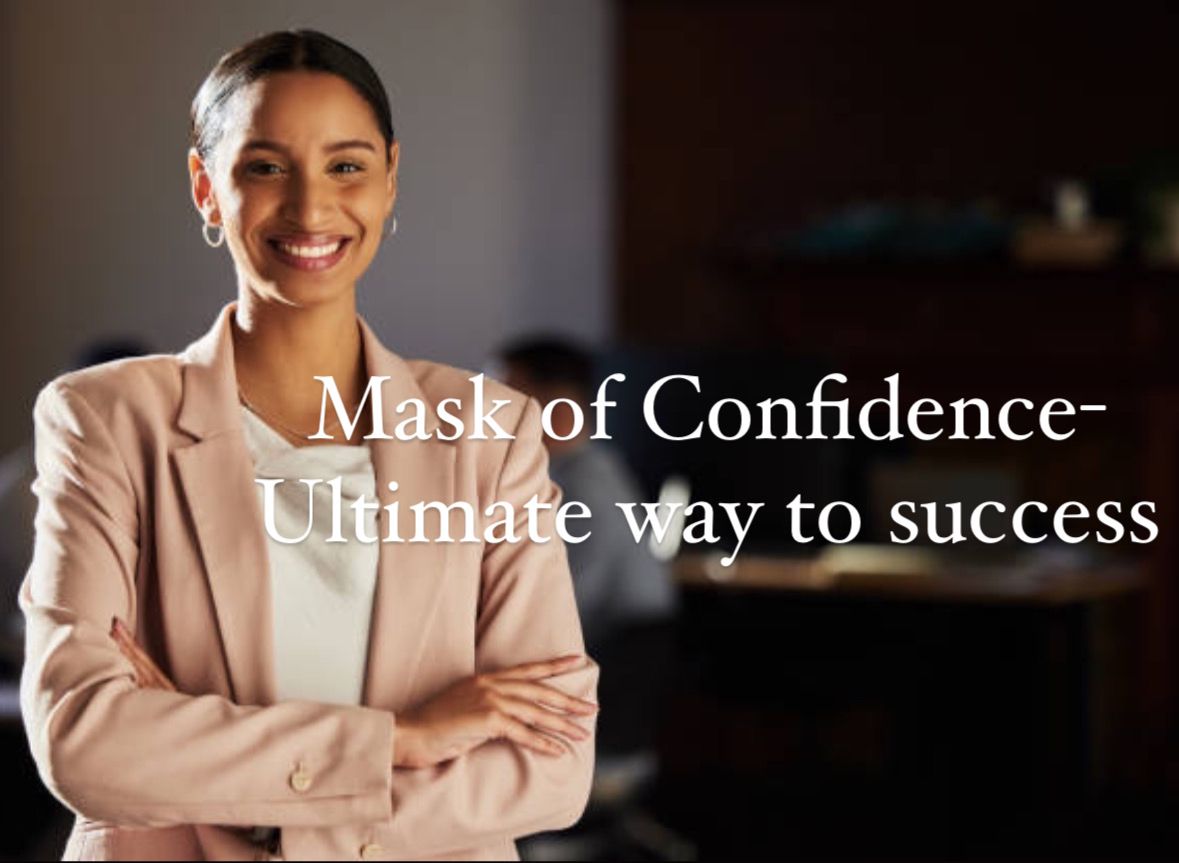The idea of a “mask of confidence” is one that dives deep into the intricate linkages between self-perception and societal expectations; it aims at understanding why people often act confident even when they are not. Many people admire and want to have the confidence. Confidence can be seen as one of the keys to success, happiness and self-realization. However, what if we only pretend to be self-confident in order to hide our insecurities and frights?

Social Currency of Confidence
In this age defined by speed and pictures, confidence has become a currency in society. Feeling good about oneself is not enough but it involves making a presentation that one is competent enough, capable enough and totally in control. Whether it is through personal relationships, professional settings or social media, appearing confident has become an overwhelming burden. Consequently, many tend to don metaphorical masks that symbolize their higher self-assurance than they genuinely have.
An extremely potent mask of confidence is possible. It helps people handle difficult circumstances, take chances, and assert their identity when they would otherwise be too afraid to do so. In some instances, even pretending to be confident can actually make one genuinely confident with time as the “faking it till you make it” strategy has been seen to boost self-esteem and reinforce positive behaviors.
Fake Mask of Confidence Both Sides
However, using the same example of confidence can be a double-edged sword. This is because, while it can aid success, it can also create inner turmoil. Inconsistency between this false demeanor and our true feelings results to cognitive dissonance that might lead into anxiety, stress and even burnout. It therefore becomes exhausting to maintain this pretense and fear of exposure is paralyzing.
Additionally, the mask of confidence may hinder one from seeking help or admitting their weaknesses. In a society where vulnerability is often associated with weakness, many people feel compelled to put on a brave face in order to hide their shortcomings. Thus, projecting fake self-assuredness could make one stagnant in terms of personal development as well as genuine self-expression becoming an obstacle for personal growth in the long run.

Perceptual Formation of Confidence through Social Media
Social media has become a more important part of our lives regarding self-confidence. For instance, platforms such as Instagram, LinkedIn and TikTok are replete with profiles that showcase success, happiness and self-assurance. It could appear that everyone is doing fine on social media due to consistent exposure to idealized versions of other people’s life thereby increasing stress in pretending to be confident all the time.
Word of caution
However, this digital environment has also given rise to imposter syndrome, where individuals may feel like frauds even when they are not. They may think that any success that comes their way is only a matter of luck or deceit rather than their own abilities and expertise hence the fear of being unmasked as impostors at any moment. This makes individuals feel more detached from others and more lonely by the mask of confidence.
Dangers in Over-Reliance on the Mask
Dependence on the mask of confidence can be very dangerous. They may fail to pay attention to their mental health and well-being owing to prioritizing keeping up appearances. Such effects include stress-related burnouts on one hand anxiety and depression among others.
The mask of confidence will also cause problems in both personal and professional relationships. Maintaining a façade often makes it difficult for people to establish deep-rooted connections with others. As a result, the kind of relationships formed are shallow as they lack sincerity and trust which are essential for meaningful associations between people. On a professional level, this will impede growth and development because such a person would hesitate seeking advice from other colleagues or take responsibility over his mistakes, thus discouraging innovation in the workplace.
Voyaging through a Misty Line
Walking on a fine line between confidence and vulnerability is an artful procedure that goes on. It should be noted that sometimes it is necessary and advantageous to show confidence. An instance in point, confidence can help one sail through high stake situations such as job interviews, or public speaking. Nevertheless, an individual should know when they need to remove their masks and be themselves.
This equilibrium can be attained by cultivating self-awareness as well as being attuned to our inner voices. When we tune into our emotions and notice how much we are relying on the mask of confidence, then we can start intentionally thinking about how we come across to others.

You may like-Magic of Love Yourself Chords
Manicure Pedicure: Pamper Your Hands and Feet
Facial Serum: An Important step toglowing skin
Overall: The true path to self-assurance
The face of confidence can either be a great tool or it could be a pitfall. It enables us to overcome failure and perform well in challenging situations; on the other hand, lead to us being torn into two halves internally; therefore, preventing our personal growth. Through embracing genuine confidence and allowing ourselves to become vulnerable, we are able to establish a stronger and more unyielding sense of self.
In the long run, deep self-confidence emanates from an individual himself/herself. It is not about pretending that one is perfect but rather accepting oneself as they are including their shortcomings. By doing away with the constant need of wearing a mask of confidence, we will have room for authentic self-expression leading to better relationships and happier lives.
This blog looks at the idea of “the mask of confidence”, arguing for balancing publicized confidence with honest self-awareness and vulnerability. THANK YOU AND KEEP LOVING!
